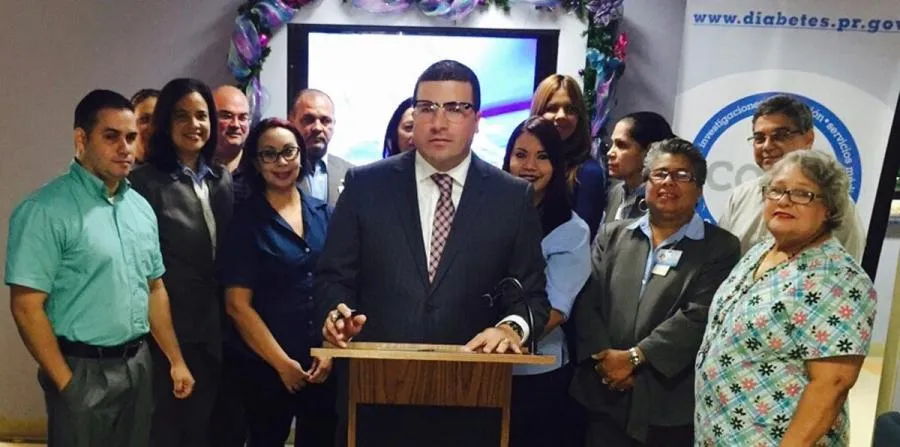The Executive Director of the Center for Research, Education and Medical Services for Diabetes, better known as the Diabetes Center for Puerto Rico (CDPR), Ramón Alejandro Pabón, announced today with the medical director, Doctor José Cangiano, that this entity is ready forOffer training so that public and private schools can establish adequate attention to students with type 1 and type 2 diabetes, as required by the new 199 Law (December/2015).
“It's good news.We are very happy with this new law that guarantees the attention to students with type 1 and type 2 diabetes in public and private schools in Puerto Rico.It requires that all schools have a protocol to attend, manage, treat and guarantee reasonable and adequate accommodation to elementary, intermediate and superior school students.At the same time, it prohibits discrimination due to the medical condition of these students, ”said Pabón.
“It was a project at the request and initiative of the Pediatric Diabetes Foundation, Parent Group and the Pediatric Endocrinologist, Doctor Carlos Leyva, which we endorse and work.We went with the rector of the Medical Sciences, Doctor Noel J. Aymat, who presides over our CDPR Board, and the endocrinologist of the CDPR, Dr. Juan Otero, to defend this project that today thanks to God is law, ”said Pabón.
“Since 2013, we achieved an alliance with the Pediatric Diabetes Foundation, the Association of Teachers and the Department of Education to offer all months training for the school staff selected to attend students with diabetes.Since then we have trained more than 700 teachers, counselors, nurses and school directors over 400 of the more than 2,000 public and private schools, ”the executive director of the CDPR answered questions from this medium.
Since 2013, the CDPR has given monthly training to school personnel to attend students with diabetes, said Pabón (to the center).(Supplied)
Since 2013, the CDPR has given monthly training to school personnel to attend students with diabetes, said Pabón (to the center).(Supplied)
“Another benefits of this law is that it now guarantees continuity to the aforementioned collective effort.According to this statute delegates to the center (CDPR) as an official entity to offer training for institutions to achieve the student's diabetes management plan and we are ready to offer it.With this new public policy, federal laws are met that safeguard students suffering from diabetes, such as section 504 of the Vocational Rehabilitation Act (1973) and the Act of Americans with disabilities (ADA), ”said Mr. Pabón,who mentioned that this year said entity managed to be certified by the American Diabetes Association and also awarded the CDPR Diabetes Management Program.
According to the new law, it establishes the “Diabetes Management School Plan: it is a written care plan, which will be written, signed and approved, by the School Director (a) and parents, managers or legal guardians of theStudent, which will include the necessary accommodations that will be carried out at school regarding meals, snacks, exercises, recreational and sports activities, within the classroom, both in academics and personally.This will be based on the Diabetes Medical Management Plan and will be written in accordance with Plan 504, written by the American Diabetes Association.This plan must be reviewed periodically and tempered to the recommendations of the Center (CDPR) ”.
Cangiano Dr.of diabetes in the CDPR.Training will be a dynamic that will include theory, simulations and application dynamics.Among the topics to be touched are: nutrition, glucose monitoring, insulin and glucagon administration, recognize and treat hypoglycemia and hyperglycemia, review acetone levels, become familiar with the diabetes monitoring equipment, recognize the possible adverse effects of high glucose levelsand low and how to perform the necessary management of student diabetes at school, among others related. ”
Pabón said that “a child with her controlled diabetes will be more productive, will have less absences and less their relapses.What will also result in economies for the State because there will be less use of medical services that are billed to the government's health plan- my health.To have an idea, it is estimated that more than 90 percent of public school students are affiliated with my health. ”
The Health Services Administrator also said that “the Department of Health has reported that for 2013 diabetes was the first cause of billing of medical plans with a total of 2,983,454 invoices and a total population that amounted to 443,844 people to whomThey were invoiced services associated with this condition in 2013, according to the first invoiced diagnosis.Of that population, 57% were females and 43% male gender.The population under 19 diagnosed with diabetes reached 16,148 or 3.64% of the total people who received diabetes treatment as indicated by the invoice.The use rate per thousand inhabitants was 123 for the entire population and 18 per 1,000 in the case of children under 19. ”
The CDPR offers education services, scientific research and medical services specialized and subspecialized multidisciplinary.It is located in the Medical Sciences site of the University of Puerto Rico.Interested persons can call the education program coordinator, Jorge Rodríguez (787) 773-8283, extensions 248 and 221 or visit: www.diabetes.pr.gov.


